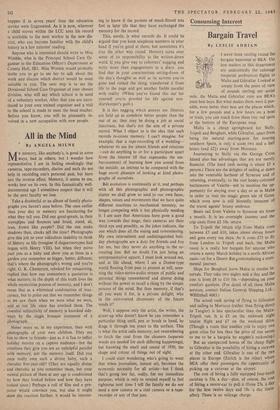All in the Mind
By ANGELA MILNE
MY memory, like anybody's, is good in some ways, bad in others; but I wonder how representative I am in feeling sneakingly that cameras, tape-recorders, diaries and such do not help in recording one's personal past, but have just the reverse effect. Memory, it seems to me, works best on its own. In this fantastically well- documented age I sometimes suspect that it will be the next faculty we lose.
Take a drawerful or an album of family photo- graphs you haven't seen before. The ones earlier than your day or memory are fascinating for what they tell you. Did our great-greats, in their stovepipes and flounces and braid, stand, sit, lean, frown like people? Did the sun make shadows then, clocks tell the time? Photographs give this jolt to your ridiculous inability to think of history as life (imagine if daguerreotypes had begun with Henry VIII), but when they move past you as a baby and show you at three in a garden you remember as bigger, better, different, that's where the photograph's wrong and you're right. G. K. Chesterton, rebuked for misquoting, replied that how one remembers a quotation is what matters; in the depth of this truth lives the whole mysterious process of memory, and I don't mean that as a whimsical condonation of inac- curacy, but to point out that we remember things as we saw them when we were what we were, and as our life since has overlaid them. The essential subjectivity of memory is knocked side- ways by the single brusque statement of a photograph.
Never more so, in my experience, than with photographs of your own children. They are fun to show to friends—just as it is fun to inflict holiday movies on a captive audience—but the emotions they give you are an unhelpful parallel with memory, not the memory itself. Did you once really own such a divine baby, such a cherubic five-year-old? (They are equally divine and cherubic as you remember them, but your mental picture of them at any age is conditioned by how they looked before and how they have looked since,) Perhaps a roll of film and a pro- jector would convince you, but also it might skew the reaction further; it would be interest-
nterest-
ing to know if the parents of much-filmed tots feel in later life that they have exchanged the memory for the record.
This, surely, is what records do. It could be argued that you keep telephone numbers in your head if you're good at them; but sometimes it's true the other way round. Memory turns over some of its responsibility to the written-down word. If you give way to exhorters' nagging and write more than engagements in a diary, you find that in your conscientious setting-down of the day's thoughts as well as its actions you've gone and ruined the thing, transferred it from life to the page and got another feeble parallel with reality (When you've found this out for yourself you're proofed for life against non- diarykeeper's guilt.) It is this nagging which annoys me. Diarists are held up as somehow better people than the rest of us; they . may be doing a job as social historians, but that's not the aim of a private record. What I object to is the idea that such records re-create memory. I can't imagine, for example, that a tape-recording of a wedding— whatever its use for absent friends and relations —can do anything to or for a participant apart from the interest (if that supersedes the em- barrassment) of learning how you sound from the outside; an interest to be compared with the huge secret pleasure of looking at kind photo- graphs of ourselves.
But evolution is continually at it, and perhaps with all this photographic and phonographic clutter we shall grow so used to our own faces, shapes, voices and movements that we have quite different reactions to mechanical memory, no longer competing with it but physically needing it. I am sure that Americans have gone a good way towards that stage; their cameras are their third eye and possibly, as the jokes indicate, the one which does all the seeing and remembering. My own intermittent and undistinguished holi- day photographs are a duty for friends and fun for me, but they never do anything in the re- creating line. But no doubt I'm just being an unrepresentative square; I must look around me, and at life ahead, where I see a Dunne-type world floating from past to present at will, scan- ning the video-stereo-audio stream of public and personal things remembered and almost doing without the power to recall a thing by the simple process of the mind. But then memory, if that's all you want it for, is a private delight; who in the extroverted chummery of the future needs it?
Well, 1 suppose only the artist, the writer, the storer-up who doesn't know he can remember a particular thing until, pen or brush in hand, he drags it through ten years to the surface. This is what the artist calls memory; not remembering to fetch the coat from the cleaners (separate words are needed for such differing happenings), but knowing the smell and sound of 1950, the shape and colour oU things out of sight.
I could start wondering who's going to want that when journalism, instant art, becomes the economic necessity for all artists—hut I think that's going too far, really, for my immediate purpose; which is only to remind myself to feel righteous next time I tell the family we do not need a new camera or a tine camera or a tape- recorder or any of that jazz.


































 Previous page
Previous page